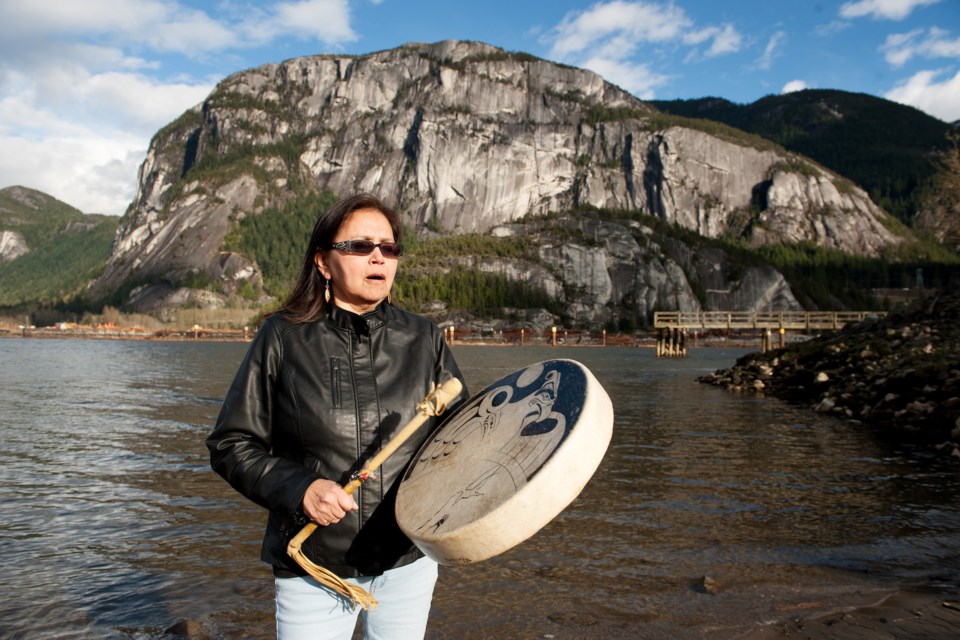This month, Squamish Nation and the Crisis Centre of BC teamed up to find better ways to help Indigenous youth improve their mental health.
With funds from a B.C. Civil Forfeiture Indigenous Rebuilding and Healing grant and a Coast Capital grant, the Crisis Centre, which focuses on suicide prevention, intervention and response, was able to work with Indigenous program co-ordinator Crystal Ricketts to help them look at their programming through an Indigenous lens.
Ricketts created the online wellness program Ha7hnitnemsh for youth, with input from the Squamish Nation community and knowledge holders, focusing on cultural connection through learning traditional protocols and oral history.
This connection to culture, Ricketts said, is a missing piece to helping Indigenous youth deal with intergenerational trauma so they can thrive in their communities.
Healing intergenerational trauma
Intergenerational trauma is passed down through generations, such as trauma from childhood separation and abuse at residential schools being passed down to today's youth, and the resulting difficulties this trauma causes. These difficulties can include mental health problems, substance use, and suicide.
"If you can imagine yourself being a child between the ages of three to five, ripped from your family, from your culture, from your being and knowing that comfort of your parents, you're ripped from them and thrown into a school with people who don't speak your language, with people who don't have the same skin colour as you, with people who do horrific things to you… comparing people who go through that to people who have not had generations of trauma — you have to address our youth a little bit different," Ricketts said.
"I think the Crisis Centre really recognizes that as an important facet in addressing youth who are Indigenous, and who have a different way of knowing and learning and healing than non-Indigenous people do, because of the effects of colonization, and the effects of the 1876 Indian Act. The cultural component for this particular program is embedded in the Sḵwx̱wú7mesh Úxwumixw tradition, ceremonies, storytelling, oral history, that helps them balance themselves around their mental, emotional, physical and spiritual beings. So having the Sḵwx̱wú7mesh Úxwumixw practice embedded or interwoven with the Crisis Centre mindfulness program, it allows our youth to acknowledge that they are Indigenous and they do learn differently and that they are resilient and they are important."
Ha7hnitnemsh (Do What's Best for Your Own Good), and the resulting learning can be an important step toward reconciliation, says Lu Ripley, director of community learning and engagement at the Crisis Centre.
Meaningful connections
The Centre's youth programming, until now, has been focused on all youth in a general way, Ripley said, and this project is recognizing the need for more work to connect with Indigenous communities in more meaningful ways.
"To have this opportunity to shed a light on wellness and wellbeing, as opposed to the suicide response which we mostly do, it's really nice to do that preventative work," Ripley said. "The program that Crystal put together, the offering was connecting to the culture…we know that that prevents suicide. We know, hands down, that that prevents suicide. It's one of the biggest things for Indigenous communities around suicide prevention, is connection to culture."
According to 2016 statistics from the Public Health Agency of Canada, suicide and self-inflicted harm are the leading cause of death among Indigenous youth in Canada. Health Canada statistics place the suicide rate of Indigenous males aged 15 to 24 at 126 per 100,000. For non-Indigenous male youth, the number is 24 per 100,000. For female Indigenous youth, the suicide rate is 35 per 100,000 compared to five per 100,000 for non-Indigenous females.
"When I look around at our families, at people in the community who are my age or younger, or older, I recognize that there are intergenerational trauma effects, and it's passed down, generations to generations," Ricketts said. "Sometimes they need that outlet that's not directly a family member. They need that outlet from our knowledge holders, to really guide them into leadership and guide them into being their own individual: independent, resilient.
Re-connecting to culture
Facilitated by Squamish knowledge holders such as Tsawaysia Spukwus (Alice Guss), the program teaches youth traditional language and protocols, as well as mindfulness and other mental health tools to help them deal with crisis and distress.
It is resonating, Ricketts says, and it gives the Master in Education student hope.
"When we are teaching our children, the young, we teach them to be leaders and we teach them to have a voice. Because for generations and generations we never had a voice. We've been hushed, we've been told you're not important, or, what you say doesn't matter.
"I'm in this wholeheartedly, and it warms my heart to see our young speaking our language and introducing themselves in the traditional Squamish way. I can't even describe the feeling. Because I grew up with little Squamish protocols; my mother was fluent…but she never spoke it because it reminded her of Indian residential school. To have our young be so involved in having their voices heard and speaking their language, it's beautiful. It starts with us. It starts with me as a mother, a grandmother, an auntie, a sister, a daughter, it starts with me to break the cycle of intergenerational trauma, because if I'm breaking the cycle of intergenerational trauma within myself, then I'm breaking the cycle for the past seven generations, my ancestors, and the next seven generations after me."
What is next?
Ripley hopes that what was learned in this program can be continued in future programming, with more collaboration with Indigenous communities moving forward.
"It's been a learning on both ends. We've learned a lot as an agency and hopefully the community got something useful from it too," she said. "The idea is to continue building relationships and working in collaboration and partnership with Squamish Nation, and the other nations."
Contact the Crisis Centre for more information, or if you are struggling with your mental health.




